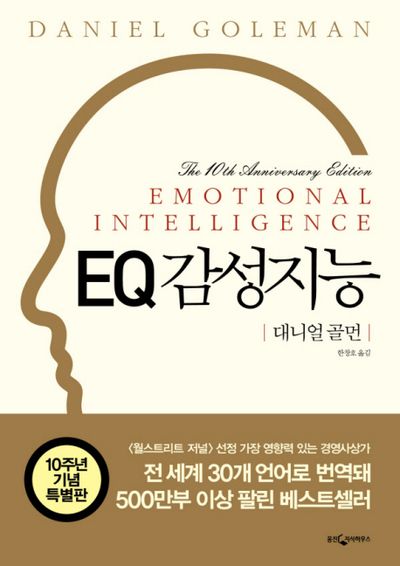
Translated by Han Changho | Published by Woongjin Knowledge House, 2008
Original Title: Emotional Intelligence
In this seminal book, Daniel Goleman introduces the concept of emotional intelligence (EI) and explores its critical role in personal and professional success. He argues that EI is more significant than traditional intelligence (IQ) in determining one’s achievements and well-being. Here are the 10 key lessons and insights from the book:
Understanding Emotional Intelligence
Goleman defines EI as the ability to recognize, understand, and manage one’s emotions while also recognizing and influencing others’ emotions. He identifies five core elements of EI: self-awareness, self-regulation, motivation, empathy, and social skills.
Self-Awareness
A fundamental aspect of EI, self-awareness involves recognizing one’s emotions and understanding how they influence thoughts and actions. Goleman emphasizes that self-awareness is essential for personal growth and effective decision-making.
Self-Regulation
The ability to manage emotions and impulses is critical, including skills like emotional control, adaptability, and maintaining a positive outlook. Self-regulation helps individuals respond thoughtfully rather than react impulsively.
Motivation
Intrinsic motivation, driven by internal values and goals rather than external rewards, is a key component of EI. People with high EI are persistent, resilient, and more likely to achieve personal and professional success.
Empathy
Empathy enables understanding and sharing of others’ emotions. Goleman highlights its importance in building strong relationships and fostering effective communication. Empathy enhances collaboration and conflict resolution.
Social Skills
Social skills, including building and maintaining relationships, effective communication, and collaboration, are crucial. These skills are essential for leadership and creating positive organizational cultures.
EI’s Impact on Success
Goleman presents research demonstrating that EI significantly influences success across various domains, including work and relationships. Individuals with high EI tend to perform better, have better mental health, and enjoy more fulfilling relationships.
Developing Emotional Intelligence
Goleman asserts that EI can be cultivated through practice and training. He provides strategies to enhance self-awareness, self-regulation, empathy, and social skills, encouraging self-reflection and mindfulness practices.
EI in Leadership
Emotional intelligence is vital for effective leadership. Leaders with high EI excel in managing teams, inspiring others, and navigating interpersonal dynamics. EI fosters positive and productive work environments.
The Neuroscience of Emotions
Goleman discusses the biological foundation of EI, explaining how emotions are processed in the brain. He highlights the roles of the amygdala and prefrontal cortex in emotional regulation and decision-making, emphasizing the profound influence of emotional responses on behavior.
Daniel Goleman’s Emotional Intelligence offers a comprehensive exploration of the concept and its importance in various aspects of life. His insights into self-awareness, self-regulation, motivation, empathy, and social skills provide a practical framework for understanding and developing EI. By recognizing the importance of EI, individuals can enhance their effectiveness, improve relationships, and achieve greater success in their endeavors.
